by Sr. Irene Balzan MMM Ireland/Malta 31.05.2024
 The feast of the Visitation is at the core of who we celebrate to be as MMMs and AMMMs.
The feast of the Visitation is at the core of who we celebrate to be as MMMs and AMMMs.
Personally, this day always infuses me with renewed life and energy as I ponder on the loving and
spirit-filled encounter between these two amazing women – Mary and Elizabeth. This year the
Visitation comes just two weeks after Pentecost. It offers us a quiet moment of reflection in the
midst of all that is happening around us. The encounter of two women – waiting, tending to the
unanticipated seed of new life deep within each one of them, supporting one another in a time
of great uncertainty- and of incomprehensible joy and wonder in knowing that God had chosen
them as the carriers of his saving message.
But also, two women whose plans were disrupted; turned-upside-down; intruded upon by one
who slipped into their normal course of affairs, sight unseen. And their lives were transformed!
And as they visited, they found in each other a kindred spirit, engendered by The Spirit. Mary and
Elizabeth…witnesses to the God of the impossible.
It seems that our world today is filled with crises of all sorts – wars; ecological devastation; the
massive movement of peoples around the globe, forced from their homes and livelihoods due to
conflict, climate change and its accompanying famine, drought, floods, fires; and perhaps the
lingering effects of a pandemic.
I wonder if we are still with the Apostles in the upper room not knowing what to do or what to
say; wondering how we can ever be witnesses of Good News to the ends of the earth in these
extraordinarily uncertain – and dangerous times. But Mary, strengthened and supported by
Elizabeth, is with us too. And she is waiting – as she did so many times before; gently reminding
us, today, that the God of the impossible, can never be outdone! So infused by this encounter
let us dare to hope and believe in the newness of life!
Mary and Elizabeth be our guides!
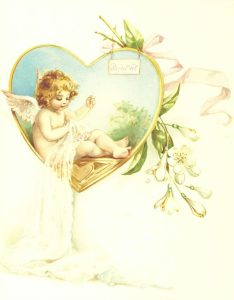 Like us all I sometimes think of Heaven. What will it be like there, what will God look like, what body will I have, and will I easily recognise everyone else? What will we all be doing?
Like us all I sometimes think of Heaven. What will it be like there, what will God look like, what body will I have, and will I easily recognise everyone else? What will we all be doing?By Sr. Siobhan O’Keefe SHJM Ireland 27.05.2024
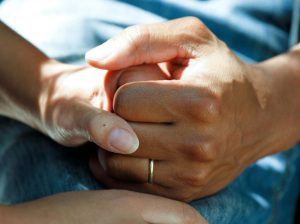 ‘We are very sorry, there is no more active treatment that we can offer you, we are referring you for palliative care.’ These can be frightening words, even when they are not totally unexpected.
‘We are very sorry, there is no more active treatment that we can offer you, we are referring you for palliative care.’ These can be frightening words, even when they are not totally unexpected.
We are all fragile human beings and illness in its many guises can visit us uninvited at any age. Modern medicine has made wonderful advances offering cure or comfort to an increasing number of illnesses. Ethical medical research continues to expand offering a better quality of life to many who suffer. Sadly, cure is not always possible, and in such situations, compassionate care is a fleshing out of the Gospel where Jesus reaches into the heart of all who suffer with the touch and words of comfort, wholeness and peace The sick person needs to know that their voice is heard at every stage of their illness and in a particular way when they have reached a palliative stage of their journey. Many but not all wish to be told the truth about their condition by their doctors and the manner in which this news is delivered is important.
A private meeting where the sick person may have the company and support of a loved one needs to be set up where the sick person, clinician and their advocate can speak openly and honestly about their concerns, fears and hopes for the future. Some may wish to be on their own with their doctor and nurse and this too needs to be respected. Many ask families and staff to listen to and honour their wishes at this most critical time. Some may wish to ask what medical and nursing care will be made available to them and is it realistic? What are the cost implications and if so, who pays? Will the person be able to continue to live at home or is admission to Nursing Home or Hospice necessary? They may need help to put financial or legal affairs in order and may need the support of a Social Worker and Solicitor to do this. All will wish to be kept comfortable and every effort undertaken to keep pain or distressing symptoms at bay.
Depending on the nature and stage of illness, the person may have a list of wishes that they would like to enjoy while they are able. A chapter of a book may need to be completed, a favourite place visited or a grand-child welcomed into the family. Some may wish to celebrate their marriage to their partner or attend a child’s wedding. Reconciliations with family or others may be necessary before the person is able to complete their journey on earth and every effort needs to be made to help them to achieve this desire.
The search for meaning in their illness will continue, all the stages of loss and grief, like anger, denial and bargaining will bubble up at different or maybe unexpected times. The person and family throughout this journey need sensitive, compassionate understanding and support so that acceptance and peace can finally be found. The cultural and faith norms of the person and family must be respected and honoured. Where an active faith is present, the presence of a minister of religion and the reception of the Sacrament of the Sick or other ritual can be a source of healing and comfort for the person and family, enabling them to surrender their lives in peace to the God who is calling them home. Many wish to plan their funeral liturgy, both in its content, place and meaning, and the celebration of their life, these wishes should be given respect.
‘Palliative care accompanies the sick person and their family on this final journey, whether the care is at home, in a hospice or hospital.’
First published in the Sacred Heart Messenger, February 2021
by Jo Doyle Ireland 25.05.2024
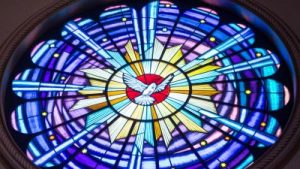 When I linger on the mysteries of God, I realize that I don’t really know an awful lot. Pentecost, however, is one of the big mysteries.
When I linger on the mysteries of God, I realize that I don’t really know an awful lot. Pentecost, however, is one of the big mysteries.
I ask, what does Pentecost mean? Often the reply is, oh, it’s the coming of the Holy Spirit. So, I ask again, what does that mean?
Most answers don’t touch my core and certainly don’t touch me enough to change me.
The tongues of fire, large winds, speaking in tongues, all connote the presence of God. Remember Moses in front of the burning bush and unable to speak! Is union with God about Pentecost?
The coming of the Holy Spirit is a bit like pulled pork, it makes sense in bits and pieces. In one Corinthians 12, there is context to the Body of Christ, which is not a single part but many. Jew, gentile, Greek, slave or free, all seemingly were included into the Body. Is inclusion part of the meaning of Pentecost? Then there were others who were called into the body, after Pentecost. Saul the antichrist who became Paul. Of course, the apostles, who had experienced the fire of the Holy Spirit, somewhat like Moses and the women, these friends of Jesus who stood at the foot of the cross, Mary his mother, along with all the other Marys, knew something powerful had happened. Even though at the descent of the Holy Spirit Mary’s name is not mentioned in the Bible, the Church says she was there. Imagine if there were no women, there would be no life.
If we are all invited by the Spirit into the Body of Christ then can you imagine the variety of gifts, but the same spirit, what a diversity of life we would have.
Are we afraid of this? A variety of people with many gifts? Life would be boring without it. It seems the spirit is inviting us into the body to use our gifts for the common good. Imagine living where only the elite were invited to use their gifts. We would end up with small myopic closed off groups afraid of change, excluding others and terrified of themselves. This is the opposite of Pentecost.
To be a Pentecost survivor you need to have the courage to be led by the Spirit. Pentecost enlightens us and aligns us to the wants of the spirit. There are few certitudes walking this way, but those who walk with Him are not naive and are willing to be led and transformed into compassion and relationship. Spirit is about relationship and if you look close enough at life, unity is created by diversity where we discover a sense of belonging to the larger. When we cling to the smaller, however, oddly enough that emphasizes difference and can isolate and alienate.
Now back to Pentecost. One body with diverse gifts. Is this a gift or do we have to earn it? We think if we are good, we will earn God’s love but being open to unity, diversity and belonging is the gift that falls on everyone if we are open to receive it. Pentecost is a discovery of who we are and what part we play.
I look to Good Friday and the wounding. The descent, rising and healing of Resurrection and then the discovery of who we are with Christ. Karl Rahner says that the only future of the Christian Church is the mystical church. Is that the call to union, to die with Him so as to rise with Him and now to answer the call of the Spirit where we will belong to the larger body?
If you look at the Vatican structure, Vatican Square is really two arms openly embracing all people who walk into it, and in alignment with this same Spirit being sent out from that full embrace to the whole world.
Can you imagine a world if that was Pentecost!
Jo Wardhaugh Doyle is farming in Kildare with her husband Matt. She has worked in Uganda, Ethiopia and Kenya, but more recently has worked with Sr Rita Kelly MMM doing the REAP programme in the Irish Missionary Union (IMU).
by Nadia Ramoutar MMM Communications Coordinator Ireland 23.05.2024
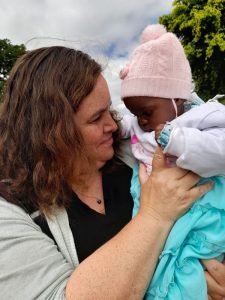 Recently, three friends of mine in their early 50s died only days apart. They didn’t know one another but I knew them all well. One died at her own birthday party of a massive heart attack. All three women were vibrant and loving family members who seemed so strong and resilient. But when death comes, that doesn’t seem to really have any significance. As my own birthday approached, I found myself fluctuating between being glad to be alive and being grief stricken with mourning. In these moments in between, the inevitable question emerges “What is the point?”
Recently, three friends of mine in their early 50s died only days apart. They didn’t know one another but I knew them all well. One died at her own birthday party of a massive heart attack. All three women were vibrant and loving family members who seemed so strong and resilient. But when death comes, that doesn’t seem to really have any significance. As my own birthday approached, I found myself fluctuating between being glad to be alive and being grief stricken with mourning. In these moments in between, the inevitable question emerges “What is the point?”
Such a question is the voice of grief without a doubt. I am sad for the children left without mothers at too young an age. I know that it is unfair that some people get to live very long lives and others do not – or is it?
What is stunning is that when we look around the world we see that certain things are not guaranteed. There is a very disturbing difference in the statistics on how long a person is expected to live based on the geography of their birth.
But, it is also clear that whether or not a woman survives childbirth depends in large part on her geography. On May 23rd we celebrate the Prevention of Obstetric Fistula to try and raise awareness to the whole world about this awful condition that is fully avoidable. After over 100 years of not seeing it often in the West the condition has recently emerged again in the UK. But sadly, we can see here again that it is only impacting a specific socio-economic group.
Seeing women die during childbirth or being profoundly scared so they can no longer experience any kind of quality of life is not just a medical issue, it is also a human rights issue. All women should be given access to what is needed when they are pregnant regardless of status, skin colour or age. Some of those dying are really still girls.
The MMMs have been pioneers in this area for many decades. We continue to provide essential ante-natal and birthing services to some of the world’s most poor and marginalised women. We will continue to expand our efforts and are able to do so through the generosity of our donors who pray for us and who contribute to our efforts.
We shall all pray that relief can be given to more and sooner. It’s only fitting that those who care about God, care about one another realising there are no “others” only us!
by Sr. Helen McKenna MMM Ireland/Tanzania 21.05.2024
Puskins is his name
He’s no more than a growing baby
gone from spoon-feeds to killing rats.
 But there’s something special about our cat
But there’s something special about our cat
He loves to contemplate.
I decide I’d like to pray
I position my cushion,
Sit cross-legged, armed with Bible and pen,
And in no time at all
Puskins has got the message.
Up he jumps, twists and turns,
Finds a comfortable position and curls up.
To be recollected he requires a few strokes
And a help with the scratching of his
pure black, shinny and now healthy coat.
He may even find a button
He’d like to kill and eat!
Then he settles down – just one more
Manoeuvre and he’s ready
He starts his mantra – one long continuous
Purr – rr – rr – rr.
This can go uninterrupted for quite some time
Then the sight of a big stray dog
or the sound of a passing fly
brings Puskins back to full alertness.
He has a look around, decides it’s not worth it
and returns to his restful purr.
I’ve watched this process now for
several weeks and I marvel at it.
How I’d love to contemplate so easily.
And I am to Puskins,
what God is to me:
The constant one, protector:-
“I sit in his longed-for shade.”
“As a child has rest on its mother’s knee…”
“Come to me, all you who are overburdened…”
“Be still and know that I am God…”
Lord, teach me to purr
To purr in the joy of your Presence
To come to you unarmed, just pawed.
Give me a greater longing
To sit curled up in your Presence
Lord, teach me to purr.
by Mary Essiet Nigeria 19.05.2024
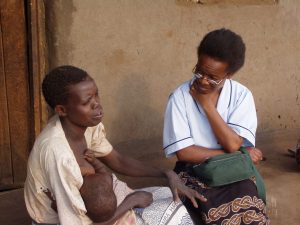
Recently, I enrolled in a listening course as one of the requirements to join a listening group where people can just sign up to talk to someone. And it has been one of the best decisions I have made.
It reminded me of when I had tried to offer solutions to a friend’s problem, when in fact, she only wanted to talk. Poor me, I had even gone ahead to tell her to hope and trust in the Lord. But for someone who felt God didn’t love her anymore, I should have been listening more actively rather than passively with the aim of a response.
Severally, I have ranted to God and he never interrupted me. He is never about chastising me or suggesting a way forward, he allows me to go on and on with my complaints and that is in itself relieving and therapeutic. I believe that God wants us to let this healing of having a listener pass through us to others. It would make so much difference if we all consciously worked towards being great listeners.
In our world today, with so much noise around, active listening has become such a rare, yet powerful gift. Listening seems like a simple act yet so impactful. It gives room for connections and allows you to walk through the path of others, feeling the emotions in their whispers/words or even the absence of both making you better equipped to show empathy and compassion.
Today, the majority seem eager to speak, but few are willing to truly listen. However, I know we do, we wish to hear and understand others, the emotions in their eyes, fear in their voice, the increased heartbeat, we want to connect with it all. We want others to know that when they wish to speak, our ears are open and our attention undivided. We probably just needed a reminder.
Are you wondering how I knew? Haha… because there is so much we can achieve through it.
Listening is hearing without judgment
Understanding without interruption
Observing in silence
With compassion and zero pretense.
It means stretching out a hand
To those in darkness that they may hold
So that together we may walk the dark path with an open heart
Climbing the hills and valleys, crossing the bridges until we see the light
All these can be achieved by first, a strong resolve to listen with intent. Let us take one communication at a time, Poco a Poco we will make the world a more compassionate place.
Mary Essiet is a native of Akwa Ibom State, Nigeria, and a medical student who heals through writing.
by Sr. Rita Kelly MMM Ireland 17.05.2024
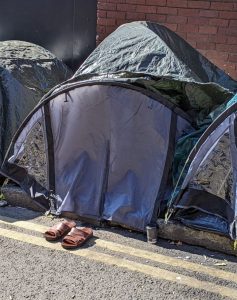 My first reaction on seeing this photograph was “I hope no -one will steal those poor man’s sandals.” This poignant picture was taken in Mount Street, Dublin. It is a photograph that has stayed with me. I wonder who is person inside the tent? Where did he come from? Has he a family in Afghanistan, Syria, Africa.? Wife and children? Did he leave his home, with the hope of a better life in Europe? Who and how much did he pay to cross borders of hostile countries and oceans? Is he still hoping or is he in despair to find himself in this country, at the western edge of Europe. Does he feel welcomed?
My first reaction on seeing this photograph was “I hope no -one will steal those poor man’s sandals.” This poignant picture was taken in Mount Street, Dublin. It is a photograph that has stayed with me. I wonder who is person inside the tent? Where did he come from? Has he a family in Afghanistan, Syria, Africa.? Wife and children? Did he leave his home, with the hope of a better life in Europe? Who and how much did he pay to cross borders of hostile countries and oceans? Is he still hoping or is he in despair to find himself in this country, at the western edge of Europe. Does he feel welcomed?
Coming from our own Irish history of emigration and at the same time a desire to be a land of a “thousand welcomes”, there is a sense of being overwhelmed. There were two protest marches in Dublin on the first Monday in May, a Public Holiday. One was an anti-immigration march, and the other pro-immigration. On 16th March when I saw on RTE news the big machines removing the tents on Mount Street, all I could feel was disbelieve. The last time I saw such images was in Nairobi and the Kenyan government breaking up the shanty towns. I did not think I would it happening in Ireland. How did we come to this state of affairs?
Immigration is complexed; there is no easy answer. I am living in Drogheda. Some months ago, the one and only main hotel in the town was destinated to be a centre for Ukrainian refugees. The local people were upset. There was no communication with them from the government. Post Covid, the local politicians, businesses and community have worked hard to improve the town to encourage tourists. The question was asked why were we not part of the consultation? There are many empty buildings in the town which could be upgraded. Sixty empty buildings were counted!! Another good point was made that if Refugees and Asylum Seekers were spread throughout the town, they would integrate quicker with the local people.
Difficult conversations are required at all levels. In many communities in Ireland there are already big issues in the lack of houses, health, and education facilities. Naturally then, there will be tensions when immigrants appear to get houses before local people who have been a long time on waiting lists.
I do believe in the good will of the Irish people. The Tent City has moved from Mount Street to the Canal. I am heartened when I hear the asylum seekers being interviewed and they say the local people and volunteers are kind. However, tensions and anti-immigrants feelings will grow if IPAS (International Protection Accommodation Service) has not the capacity and support to respond. The number of immigrants coming is unprecedented, but we are a rich country and have the resources.
Each person who comes to our shores is a human being with their own hopes and fears. I think of this man who put his sandals outside the tent, and I hope we will treat each person with dignity and not get lost in our conversations and debates.
Exodus 23:9
God of Love, I pray that You fill Your people’s hearts with even more compassion. I pray that the refugees and asylum seekers are not oppressed by those around them. I pray that people do not oppress the foreigners because we all know how it feels to be a foreigner or someone who does not neatly fit in their environment. Let Your people’s hearts be filled with empathy, let those seeking refuge be blessed, Amen.
by Sr. Margaret Anne Meyer MMM USA 15.05.2024
 In a few days, the 10th of May 2024, will loom up. It will be the 60th year celebration of our Final Medical Class. Where did all those years go since MAY 1964? As I write this blog tender memories lurch up of what it was like to undergo those final months of preparing for our examination. I remember trying to re-study all we had learned in previous years and store it in my brain like a computer would do these days. Yet at that time a thing like a computer was only in the birthing stages.
In a few days, the 10th of May 2024, will loom up. It will be the 60th year celebration of our Final Medical Class. Where did all those years go since MAY 1964? As I write this blog tender memories lurch up of what it was like to undergo those final months of preparing for our examination. I remember trying to re-study all we had learned in previous years and store it in my brain like a computer would do these days. Yet at that time a thing like a computer was only in the birthing stages.
Thank God we had beautiful Christmas celebrations to recharge, relax and enjoy. So many secondary schools invited us to Guilbert and Sullivan plays. They were so enjoyable, and how Blackrock College managed to have such exquisite female voices coming from male students was a tremendous feat of delight.
Mid-January arrived all too soon and attendance at clinics, tutorials, and lectures; giving medical and surgical presentations, and intense study continued. Prayer, that God would get us through to serve Him in Africa, was always on our lips.
We had a little sampling of what the exams would be like by taking the ECFMG exam. The initials stood for Educational Commission for Foreign Medical Graduates. The exam started in the morning and lasted a long time. It was an American based exam of multiple choice, true and false, and little or no direct questions that we were used to in writing for30 minutes. Two of the five choices seemed correct and sometimes it was difficult to make a choice. There was a test for English attached to it and it was the most difficult I had ever seen. Thank God we all passed. We took the exam as a basis of being allowed to practice in the USA upon further internships and taking American Boards
Soon it was time for our own exams in Medicine and Surgery. We could be asked anything pertaining to Anatomy, Physiology, Pathology Pharmacology, and other subjects we had studied throughout the 5 years. Somehow, I did not find them too difficult and had studied the material. The clinical presentation and oral examinations followed. I recall one Doctor questioning me on the treatment of congenital neurological disease. He asked me what was the cure for these diseases? I vaguely remembered them from Pediatrics, but I told him there was no cure. He told me a good glass of Guiness would help. We smiled.
I can remember the details of my medicine and surgical presentations when we had 30 minutes to examine the patient and make a diagnosis. One patient had renal hypertension with retinopathy. I could not make the surgical diagnosis until the last minute when the patient told me that he had gone to a wedding a few weeks previously and was unable to pass urine. I felt extremely fortunate when the examiners came in several minutes later and the diagnosis was clear. We were taught that if you listened well enough, the patient would tell you what was wrong with them.
The one I do not remember is my Obstetric exam, The examiner was the brother of our President, Eamon de Valera. Professor de Valera asked me what class of a nun I was? I was very troubled. I did not like to say first class, but I did not think I was second class and definitely not third class. I told him I was a Meical Missionary of Mary. He seemed pleased with that. I was wearing a brown speckled colored suit and yellow blouse. I did not tell him I was a nun, but we wore no makeup or high heels as the other female students did.
Even today, I can recall our gratitude to God for coming through with flying colors. Doctor Maura Lynch received first place in our class of seventy with honors in Medicine and Surgery. Sister Doctor Martha Collins received second class honors in Surgery. I passed my exams.
There was great rejoicing in Rosemount. We stayed around for a while encouraging the younger students not to be afraid and to continue their studies.
Our intern year would commence on July first and conferring would be on July 14th. And that is ANOTHER STORY.
by Jo Doyle Ireland 13.05.2024
 Recently a friend of mine from Kenya strikingly said to me,
Recently a friend of mine from Kenya strikingly said to me,
“Is the world trying to eliminate Christ?”
My thoughts about that where, how can we eliminate Light?
During this time from the Easter Resurrection to Pentecost, we really should be asking such vital questions of ourselves. Saying that, I was left wondering more than I was able to answer. I’ve scratched my head and said to myself,
“What is the Way of Resurrection?”
I was stuck, maybe I could look up some theological answer, but would that change my heart?
I tended to constantly go back again and again to looking at,
“The way of the wound.” Surely that path directs us to Resurrection?
Today’s vocabulary tells us of how we are wounded, but we need a vocabulary to tell us how we are healed. PTSD. Post Traumatic Stress Disorder. PTS Post Traumatic Stress. PTSR Post Traumatic Stress Reaction. CPTSD Complex Post Traumatic Stress Disorder, depression and addictions. Healing from all these initials and titles is in spiritual terms an invitation to,
Die with Him and also an invite to be Resurrected with Him.
Our wounds either make us or break us and the deeper our wounds pierce us, the harder we have to work to find healing. Our healing journey cannot be grounded in platitudes but in the search for love and finding those who know how to do just that. There may simply be a living flame of love that heals. The Spirit joins us both in our suffering, our encounter, and our healing. Plainly put, love is the answer.
What gives me hope in looking for Resurrection is firstly that we are all wounded. We all have a touch of something.
What gives me hope is the slow acceptance of our vulnerability and in our owned fracturedness we transform to become compassion. Life is rarely the same after a wounding, we all know that, and after being broken open I have to stop and ponder who am I now, what is my identity, what has been my identity from the very beginning.
The Book of Revelation is not the last book in the Bible for nothing, but we do need to have the courage to walk through this revelation door. This is where God will show us our new name, identity and calling.
Is this Resurrection?
What happens if Resurrection comes from our woundedness and weakness?
How scary is that!
Where will this take us?
Surely our woundedness calls us into a greater participation in life and living.
I believe that this is the call of the wound.
So what happens if we ignore this way.
Will we miss it? Our own Resurrection that is?
Is that why the apostles were so frightened because they knew the depth of transformation and spiritual growth inherent in every wound. Is it because they knew the depth of transformation which is needed to let love burn within them.
In Resurrection I find my name. I find Christ, the Light, within me and outside of me. Is my heart not burning?
Maybe I need to pray,
Come Holy Spirit fill the hearts of your faithful and enkindle in me the fire of your love.
Jo Wardhaugh Doyle is farming in Kildare with her husband Matt. She has worked in Uganda, Ethiopia and Kenya, but more recently has worked with Sr Rita Kelly MMM doing the REAP programme in the Irish Missionary Union (IMU).
